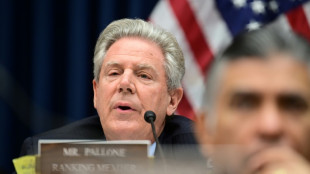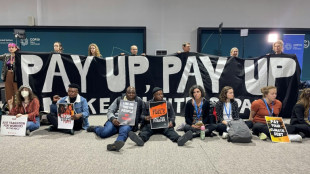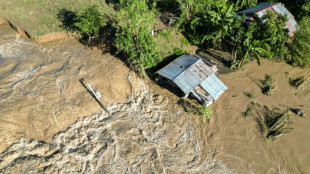
-
 Iran faces fresh censure over lack of cooperation at UN nuclear meeting
Iran faces fresh censure over lack of cooperation at UN nuclear meeting
-
Despondency and defiance as 45 Hong Kong campaigners jailed

-
 Scholar, lawmakers and journalist among Hong Kongers jailed
Scholar, lawmakers and journalist among Hong Kongers jailed
-
European stocks slide on fears of Russia-Ukraine escalation

-
 Police break up Georgia vote protest as president mounts court challenge
Police break up Georgia vote protest as president mounts court challenge
-
Spain royals visit flood epicentre after chaotic trip

-
 France's Gisele Pelicot says 'macho' society must change attitude on rape
France's Gisele Pelicot says 'macho' society must change attitude on rape
-
G20 leaders talk climate, wars -- and brace for Trump's return

-
 US lawmaker accuses Azerbaijan in near 'assault' at COP29
US lawmaker accuses Azerbaijan in near 'assault' at COP29
-
Tuchel's England have 'tools' to win World Cup, says Carsley

-
 Federer hails 'historic' Nadal ahead of imminent retirement
Federer hails 'historic' Nadal ahead of imminent retirement
-
Ukraine vows no surrender, Kremlin issues nuke threat on 1,000th day of war

-
 Novo Nordisk's obesity drug Wegovy goes on sale in China
Novo Nordisk's obesity drug Wegovy goes on sale in China
-
Spain royals to visit flood epicentre after chaotic trip: media

-
 French farmers step up protests against EU-Mercosur deal
French farmers step up protests against EU-Mercosur deal
-
Rose says Europe Ryder Cup stars play 'for the badge' not money

-
 Negotiators seek to break COP29 impasse after G20 'marching orders'
Negotiators seek to break COP29 impasse after G20 'marching orders'
-
Burst dike leaves Filipino farmers under water

-
 Markets rally after US bounce as Nvidia comes into focus
Markets rally after US bounce as Nvidia comes into focus
-
Crisis-hit Thyssenkrupp books another hefty annual loss

-
 US envoy in Lebanon for talks on halting Israel-Hezbollah war
US envoy in Lebanon for talks on halting Israel-Hezbollah war
-
India to send 5,000 extra troops to quell Manipur unrest

-
 Sex, drugs and gritty reality on Prague's underworld tours
Sex, drugs and gritty reality on Prague's underworld tours
-
Farmers descend on London to overturn inheritance tax change

-
 Clippers upset Warriors, Lillard saves Bucks
Clippers upset Warriors, Lillard saves Bucks
-
Acquitted 'Hong Kong 47' defendant sees freedom as responsibility

-
 Floods strike thousands of houses in northern Philippines
Floods strike thousands of houses in northern Philippines
-
Illegal farm fires fuel Indian capital's smog misery

-
 SpaceX set for Starship's next flight, Trump expected to attend
SpaceX set for Starship's next flight, Trump expected to attend
-
Texans cruise as Cowboys crisis deepens

-
 Do the Donald! Trump dance takes US sport by storm
Do the Donald! Trump dance takes US sport by storm
-
Home hero Cameron Smith desperate for first win of 2024 at Australian PGA

-
 Team Trump assails Biden decision on missiles for Ukraine
Team Trump assails Biden decision on missiles for Ukraine
-
Hong Kong court jails 45 democracy campaigners on subversion charges

-
 Several children injured in car crash at central China school
Several children injured in car crash at central China school
-
Urban mosquito sparks malaria surge in East Africa

-
 Djibouti experiments with GM mosquito against malaria
Djibouti experiments with GM mosquito against malaria
-
Pulisic at the double as USA cruise past Jamaica

-
 Many children injured after car crashes at central China school: state media
Many children injured after car crashes at central China school: state media
-
Asian markets rally after US bounce as Nvidia comes into focus

-
 Tens of thousands march in New Zealand Maori rights protest
Tens of thousands march in New Zealand Maori rights protest
-
Five takeaways from the G20 summit in Rio

-
 China, Russia ministers discuss Korea tensions at G20: state media
China, Russia ministers discuss Korea tensions at G20: state media
-
Kohli form, opening woes dog India ahead of Australia Test series

-
 Parts of Great Barrier Reef suffer highest coral mortality on record
Parts of Great Barrier Reef suffer highest coral mortality on record
-
Defiant Lebanese harvest olives in the shadow of war

-
 Russian delegations visit Pyongyang as Ukraine war deepens ties
Russian delegations visit Pyongyang as Ukraine war deepens ties
-
S.Africa offers a lesson on how not to shut down a coal plant

-
 Italy beat Swiatek's Poland to reach BJK Cup final
Italy beat Swiatek's Poland to reach BJK Cup final
-
Japan, UK to hold regular economic security talks


Women ride Pakistan's economic crisis into the workplace
Amina Sohail veers through heavy traffic to pick up her next passenger –- the sight of a woman riding a motorcycle drawing stares in Pakistan's megacity of Karachi.
The 28-year-old is the first woman in her family to enter the workforce, a pattern emerging in urban households coming under increasing financial pressure in Pakistan.
"I don't focus on people, I don't speak to anyone or respond to the hooting, I do my work," said Sohail, who joined a local ride-hailing service at the start of the year, transporting women through the dusty back streets of the city.
"Before, we would be hungry, now we get to eat at least two to three meals a day," she added.
The South Asian nation is locked in a cycle of political and economic crises, dependent on IMF bailouts and loans from friendly countries to service its debt.
Prolonged inflation has forced up the price of basic groceries such as tomatoes by 100 per cent. Electricity and gas bills have risen by 300 per cent compared to July last year, according to official data.
Sohail used to help her mother with cooking, cleaning and looking after her younger siblings, until her father, the family's sole earner, fell sick.
"The atmosphere in the house was stressful," she said, with the family dependent on other relatives for money. "That's when I thought I must work."
"My vision has changed. I will work openly like any man, no matter what anyone thinks."
- 'Get her married' -
Pakistan was the first Muslim nation to be led by a woman prime minister in the 1980s, women CEOs grace power lists in Forbes magazine, and they now make up the ranks of the police and military.
However, much of Pakistani society operates under a traditional code which requires women to have permission from their family to work outside of the home.
According to the United Nations, just 21 percent of women participate in Pakistan's work force, most of them in the informal sector and almost half in rural areas working in the fields.
"I am the first girl in the family to work, from both my paternal and maternal side," said Hina Saleem, a 24-year-old telephone operator at a leather factory in Korangi, Karachi's largest industrial area.
The move, supported by her mother after her father died, was met with resistance from her extended family.
Her younger brother was warned that working could lead to socially unacceptable behaviour, such as finding a husband of her choice.
"My uncles said 'get her married'," she told AFP. "There was lots of pressure on my mother."
At the changeover of shifts outside the leather factory, workers arrive in painted buses decorated with chinking bells, with a handful of women stepping out amid the crowd of men.
Nineteen-year-old Anum Shahzadi, who works in the same factory inputting data, was encouraged by her parents to enter the workforce after completing high school, unlike generations before her.
"What is the point of education if a girl can't be independent," said Shahzadi, who now contributes to the household alongside her brother.
Bushra Khaliq, executive director for Women In Struggle for Empowerment (WISE) which advocates for political and economic rights for women, said that Pakistan was "witnessing a shift" among urban middle class women.
"Up until this point, they had been told by society that taking care of their homes and marriage were the ultimate objective," she told AFP.
"But an economic crunch and any social and economic crises bring with them a lot of opportunities."
- 'We are companions' -
Farzana Augustine, from Pakistan's minority Christian community, earned her first salary last year at the age of 43, after her husband lost his job during the Covid-19 pandemic.
"My wife had to take over," Augustine Saddique explained to AFP.
"But it is nothing to be sad about, we are companions and are running our house together."
The sprawling port metropolis of Karachi, officially home to 20 million people but likely many millions more, is the business centre of Pakistan.
It pulls in migrants and entrepreneurs from across the country with the promise of employment and often acts as a bellwether for social change.
Nineteen-year-old Zahra Afzal moved to Karachi to live with her uncle four years ago, after the death of her parents, leaving her small village in central-eastern Pakistan to work as a childminder.
"If Zahra was taken by other relatives, she would have been married off by now," her uncle Kamran Aziz told AFP, from their typical one room home where bedding is folded away in the morning and cooking is done on the balcony.
"My wife and I decided we would go against the grain and raise our girls to survive in the world before settling them down."
Afzal beams that she is now an example for her sister and cousin: "My mind has become fresh."
O.Gutierrez--AT
